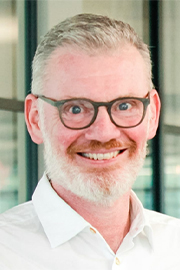In this interview conducted at SLAS EU 2023 in Brussels, Belgium, we spoke to Garry Pairaudeau, Chief Technology Officer at Exscientia*, about pharmatech, AI, and more.
Please can you introduce yourself and tell us what inspired your career in science?
My name is Garry Pairaudeau, and I am the Chief Technology Officer at Exscientia. We are an AI-driven pharmatech company.
I first got into science because I was inspired by my father. He was an engineer, and I remember that from a young age, our house was filled with little engineering projects. That engendered an innate curiosity and a desire to discover how things worked.
That led me to a degree and a Ph.D. in chemistry. I worked for AstraZeneca for 27 years as a chemist leading drug projects and chemistry departments and ultimately leading their global chemistry network.
I joined Exscientia two and a half years ago. I was fascinated by the world of biotech. I have always had a passion for technology and a belief that drug discovery can be made more effective through the application of technology.
You are the Chief Technology Officer at Exscientia, a leading pharmatech company using AI to engineer new drugs. Can you tell us some more about Exscientia and some of your core values and missions?
Our company name is Latin; it means ‘from knowledge,’ and that is what we at Exscientia strive for. The company is focused on learning how to apply technology to drug discovery to accelerate learning.
In terms of core values, it is a wonderful company to work for. Despite being a technology company, I think our core value is that we put people first. Fundamentally, it is about having brilliant people working together collaboratively to build things, invent things, and create new processes and new ways of working.
Our mission is to change how the world invents medicines, and we want to do that by encoding and automating drug discovery. By encoding, we mean teaching and learning, and the automation side is about how we speed up and increase reproducibility. It is really about fusing together technology and science into what we call pharmatech.
You are leading the development of a new scientific discipline: pharmatech. Can you tell us more about what ‘pharmatech’ is and how vital AI is in its practices?
Pharmatech excellently describes what we do at Exscientia. It means a blend of pharmaceutical research, drug discovery, core drug discovery skills, laboratory skills, et cetera, all blended with technology using the latest technological advances.

Image Credit: ktsdesign/Shutterstock.com
Pharmatech, to us, means blending deep drug discovery expertise with technology. Exscientia is all about how we use technology to accelerate the discovery of medicines and the development of medicines.
Everything we are trying to do is founded on technology. Artificial intelligence is a key part of that, although not everything we do is AI-driven. We have built extensive physics-based methods, we use molecular dynamics, we use quantum mechanics, for example, but at the core of all of our platforms is AI.
What role does AI currently play in the field of drug discovery, and how do you see this changing over the next ten years? Are there any challenges that must be overcome before it becomes more commonplace in research settings?
We have been looking to build an end-to-end drug discovery and development platform, starting with target identification. At the core of our company is drug discovery, and we work in both small molecule drug discovery and biologics drug discovery, building a completely digitized, AI-enabled drug design platform.
We have also recently moved into the realm of biomarker identification, where we have been using computer vision and analysis of individual patient samples to derive biomarkers.
We soon hope to be able to design adaptive clinical trials and Bayesian methods for our own clinical trials.
Garry Pairaudeau - SLAS Europe 2023
Garry Pairaudeau - SLAS Europe 2023 from AZoNetwork on Vimeo.
I see technology and AI being applied all the way down the value chain in drug discovery. We are super proud of Exscientia’s work, and we now have six molecules in clinical trials designed using artificial intelligence. I believe that within the next ten years, AI will be used in the discovery of all molecules.
SLAS dedicates a large portion of its exhibition and conference to drug discovery, especially the automation of various processes in this field. What role do you believe technology plays in accelerating drug discovery, and how vital is automation in speeding up what can often be tedious processes?
I think technology has and will continue to play a pivotal role in the transformation of drug discovery. Technology has changed the world, and I think the pharmaceutical industry needs to embrace technology and the digitization of its processes.
Automation is critical. I am old enough to have been involved in drug discovery for quite some time, and I remember the first inventions of HTS screening and HTS robotics. People are now collaborating with robots, and new technologies are being incorporated into conventional processes. We are revolutionizing drug discovery with technology and automation.
At Exscientia, you are utilizing technological advancements and new tools, such as AI, to improve drug discovery processes. As the first company to have an AI-designed molecule enter clinical trials, how are you combining these disciplines to enable the delivery of new treatments?
Thinking about how AI can increase the benefit of medicines to patients is really, really important. One of the things we are really excited about is the patient tissue platform that we have been developing at Exscientia. This is a platform where we take individual patients’ tumor cells and, without transforming or transecting those cells or changing them in any way, we can image them on a microtiter plate.

Image Credit: motorolka/Shutterstock.com
Using the computer vision methods that we have developed, we are able to understand the effects of drug molecules on those cells at an individual patient level, which means that you can stratify patients so that you can tailor the treatment precisely to the individual person, and use it to develop biomarkers that ensure that the medicine is going to work.
Some of the greatest challenges in clinical development are achieving maximum response rates for patients and understanding how to prevent patients from receiving treatments that will not work for them. We believe this platform, particularly in the areas of oncology, has the potential to have tremendous benefits for patients.
You were the closing keynote speaker at SLAS EU 2023, where you gave a presentation on ‘The future of AI-enabled drug discovery’. Can you tell us more about what you discussed in this talk?
Being at SLAS and giving the closing keynote speech was a really exciting opportunity. My talk was centered on the integration of AI-driven design with automated laboratory processes. This will enable us to drive learning cycles far more rapidly than we have been able to in the past.
I am super excited that we have exquisite computational control over our design processes, which will allow us to integrate those design processes and the molecules we are making into our automated platform. I think that is key.
Viewing this as a holistic process, it is not about design and automation. It is about an ecosystem of automated design, making, and testing that is going to allow us to revolutionize the process in the future.
As a European drug discovery company, what makes Europe an exciting place to be? What more can be done surrounding investments to help us continue the amazing developments currently happening in Europe?
Founded 11 years ago, Exscientia is a spin-off of Dundee University - one of the top life sciences universities in the UK. We moved to Oxford for the proximity to the Oxford ecosystem and, in part, Oxford University and the whole biotech cluster in Oxford. We have an office in Cambridge and another in Vienna.
I think the European ecosystem is very vibrant. Science is fantastic in the UK and Europe, and I think this is really important for us. We also have an office in Miami and one in Boston, so the US is also very important for us.
When it comes to ensuring the continuation of the amazing developments currently happening in Europe, I think there are two things that can be done. One is about making investments and creating an environment, particularly now in relatively challenging economic conditions, where new companies can thrive and startups can be created.
But it is also about investing in the education of young people. This is something I am really passionate about. I think creating that flow of talent in Europe is really important. Maintaining the high level of academic institutions that allow us to develop that talent is an important thing to invest in.
What is next for you and Exscientia? Are you involved in any exciting upcoming products that you can tell us about?
We are super excited about our automation studio that I am talking about at SLAS. We are at the beginning of that journey, and we are hugely focused on making that a success and deriving maximum benefits from it. I think that is going to be a key focus for us over the next year or two.
Apart from that, we have lots of other really exciting projects in the pipeline that I cannot tell you about just yet.
About Garry Pairaudeau
*Garry was the CTO at Exscientia, a leading AI drug discovery company, until July 2022, when it was announced he will be stepping down from his position as CTO, but remains at Exscietia in an advisory role. With more than 25 years’ of experience in drug hunting and technology leadership, he is responsible for focusing Exscientia’s technology on its mission to change the way the world invents impactful medcines. He leads a world-class team of engineers, scientists and informaticians driving innovation at the interface between technology and drug discovery. 
Prior to joining Exscientia, Garry was Vice President of Hit Discovery at AstraZeneca and Chair of the Global Chemistry Leadership Network where he was responsible for the global chemistry strategy, initiatives and collaborations. During his time at AstraZeneca, he championed developments in AI, machine learning and physics based computational methods. He also successfully established an automation facility in Gothenburg, dedicated to synthesis and integrated screening.
He has extensive drug hunting experience a highlight being part of the team that discovered the cardiovascular drug Brilinta® (ticagrelor) for which he was a co-recipient of the Malcolm Campbell award from the Royal Society of Chemistry. He is passionate about transforming drug discovery and bringing the life changing benefits of medicines to patients faster.